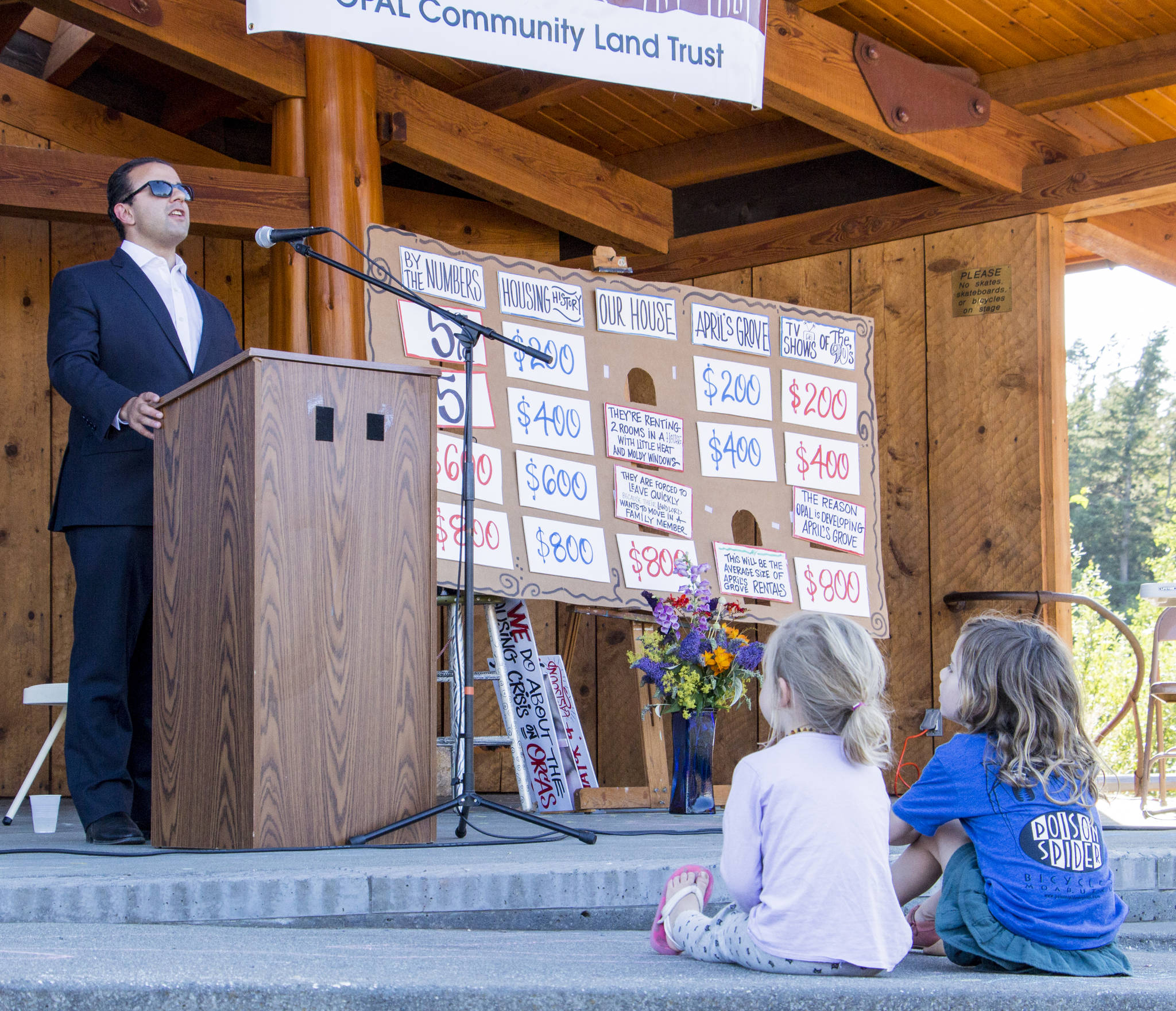The topic of affordable housing on Orcas is a large enough issue that Lieutenant Governor Cyrus Habib planned his day around a rally in support of OPAL Community Land Trust on Wednesday, July 12.
“We need to do every single thing in our power … to make sure the necessary funds from the state and federal government go to organizations like OPAL that are doing the right thing,” said Ranker. “It’s tough when you’re fighting for stuff that you believe are your core values, like protecting women’s rights; protecting LGBTQ rights; fully funding our schools; and fully funding organizations like OPAL through the Housing Trust Fund. And the person on the other side of the table from you just says no.”
Prior to the two politicians taking the stage to discuss affordable housing, an islander who has benefitted from the OPAL program, Mallory Hagel, played Alex Trebek in a short scripted round of “Affordable Housing Jeopardy.” One of the game categories was “90s TV shows.”
“I just want to say, I think 90s TV shows are actually at the core of what OPAL does. And why we’re here today,” said Habib. “There are ‘Growing Pains’, but we are addressing them ‘Step-by-Step’ and above all, this Orcas Island ‘Family Matters.’”
Habib’s speech topics ranged from how he lost his eyesight in 1989 at age eight, how he imagines everyone looks like Cyndi Lauper and Boy George to how he raised $850,000 to pay for 15,000 students on free and reduced lunches to take advanced placement tests.
“Cyrus Habib has been this driving force for good, literally,” said Ranker. “It’s like he’s coming into Mordor and taking over, just fixing it all.”
Habib has a history of overcoming struggles to succeed in life. He remembered a time in the third grade when he was being kept away from playing with other kids on the playground because the school feared he would get hurt.
“Knowing that I had recently become blind … [the school] kept me by the side of the school with the recess monitor while the other kids were playing,” said Habib.
His mother came to his defense, telling the school, “You know, it may happen that my son may slip and fall. It may even happen that he may slip and fall and break his arm. I can fix a broken arm, but I can never fix a broken spirit.’”
That lesson, said Habib, is why he fights so hard for disenfranchised people.
“Everything I’ve done comes from that moment in the playground,” said Habib. “When we think about the playground of life, we have to think about those who are on the outside, who are being excluded. And this country drew my parents, and countless other people here because it offers the promise of a playground where everyone has access. Of a place where no one will feel that sense of exclusion … You will never be an affluent community if you don’t take care of every single person who is here.”
Ranker spoke about the importance of programs like OPAL in tourism-based communities like such as Orcas. He doesn’t want Orcas to “turn into another Nantucket.”
“They (Nantucket) literally are flying in and ferrying in their workforce. The diversity of the community is gone … OPAL, for years, has been the driving force in making sure that we maintain the diversity in our community that makes our community so very important,” said Ranker. “It is because we have put a foot forward and put a line in the sand and said ‘we shall not become Nantucket.’ We celebrate diversity. We celebrate everything that is us. We celebrate these little kids … It’s about making sure that we don’t become a bunch of exclusively, mainly senior, wealthy people.”
Ranker reflected upon how when his grandmother bought her house on Orcas Island in 1969, it was still an affordable community. Now, the median price for a home on Orcas is $700,000, he said.
“What we need to do is support OPAL so we can continue to have that diverse, thriving community that we love,” said Ranker. “We don’t want to wake up in the future realizing we messed up. We don’t want to wake up in the future realizing we’re not the place we fell in love with.”



